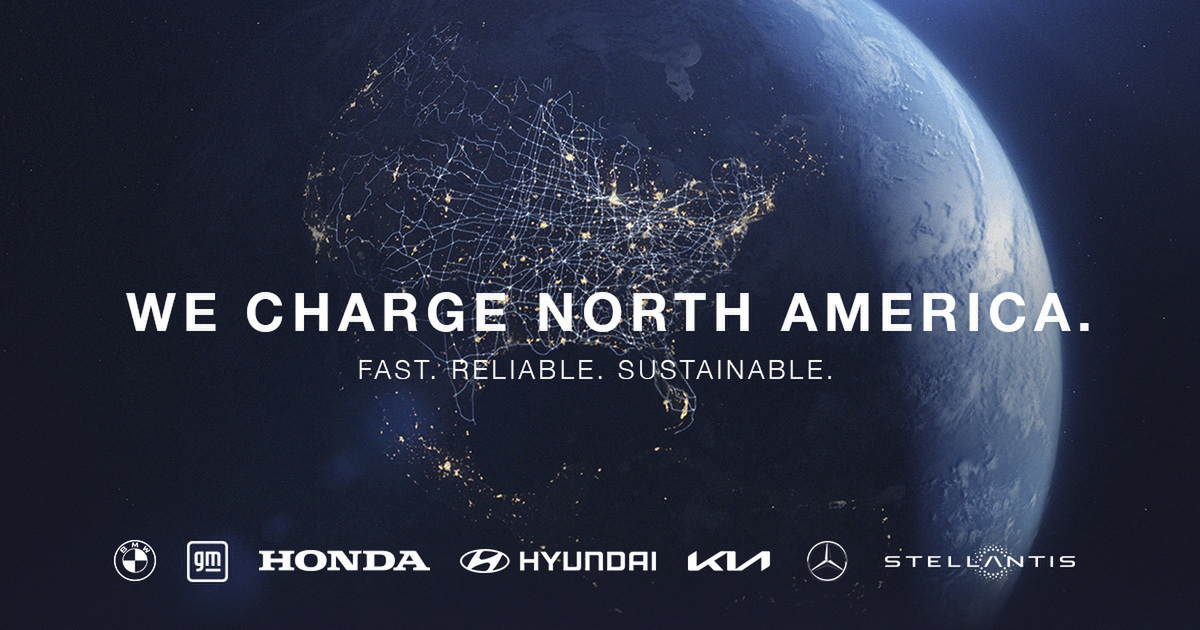 |
An image representing the new North American charging network established by BMW, General Motors, Honda, Hyundai, Kia, Mercedes-Benz and Stellantis (Hyundai Motor Group) |
South Korean carmakers Hyundai Motor Company and its sister firm Kia have joined forces with five global auto giants -- BMW, General Motors, Honda, Mercedes-Benz and Stellantis -- to form a joint venture for establishing an electric vehicle charging network across North America, in a combined effort at curbing Tesla’s attempt at EV charging standardization.
The seven companies announced on Wednesday in US time that the joint venture will set up at least 30,000 chargers by 2030, saying that it initially plans to deploy charging stations in metropolitan areas and along major highways.
The joint venture is expected to be established later this year, after customary closing conditions are met and regulatory approvals are granted. Although the companies did not disclose the amount of the investment, the Wall Street Journal reported that the participating firms will spend at least $1 billion (1.27 trillion won) for the joint venture.
“Hyundai’s investment in this project aligns with our ‘Progress for Humanity’ vision in making sustainable transportation more accessible,” said Chang Jae-hoon, CEO of Hyundai Motor Company.
“Hyundai’s expertise in electrification will help redefine the charging landscape and we look forward to working with our other shareholders as we create this expansive high-powered charging network.”
According to the announcement, the first charging stations are expected to open in the US in the summer of 2024 and in Canada at a later date.
The automakers said the new charging stations will be accessible to all battery-powered EVs from any automaker using Combined Charging System (CCS) or North American Charging Standard (NACS). Each site will have multiple high-powered DC chargers and be solely run on renewable energy in line with the sustainability strategies of all seven automakers.
They noted that the stations will be offering canopies wherever possible, and amenities such as restrooms, food service and retail operations either nearby or within the same complex. There will also be a number of select flagship stations that offer a glimpse of the future of charging experience.
The automakers stated that the charging stations are expected to meet or exceed the requirements of the US National Electric Vehicle Infrastructure program. Under the NEVI program, the Biden administration set aside $7.5 billion in funding for EV charging in the US.
“Kia's engagement and investment in this high-powered charging joint venture is set to increase charging access and convenience for current and future drivers and therefore accelerate the transition to EVs across North America,” said Song Ho-sung, CEO of Kia.
“Kia is proud to be an important part of this joint venture with other reputable automakers as we embark on a journey toward seamless charging experiences for our customers and further strengthening Kia’s brand identity in the EV market,” Song added.
According to the Korea Automobile and Mobility Association, the two Korean companies’ EV market share accounted for about 7 percent of the total US EV market in the first half of this year.
The unprecedented EV charging alliance between the global auto leaders is a swing at Tesla’s unchecked rise to the top of charging standardization. Tesla currently takes up about 60 percent of the high-powered EV chargers across the US.
As NACS is used by Tesla, the dominant leader in the North American EV market, US automakers such as GM, Ford and Rivian have mentioned that they will either follow Tesla’s standard or consider doing so.
“With electric vehicle sales expected to exceed 50 percent of total US sales by 2030, the expansion of reliable charging infrastructure will become even more critical to widespread electric vehicle adoption,” the seven companies said in a statement.
“The creation of a best-in-class charging network will ensure that the EV infrastructure will support current and projected EV sales and will foster the adoption of electric vehicles.”







![[Today’s K-pop] Blackpink’s Jennie, Lisa invited to Coachella as solo acts](http://res.heraldm.com/phpwas/restmb_idxmake.php?idx=644&simg=/content/image/2024/11/21/20241121050099_0.jpg)